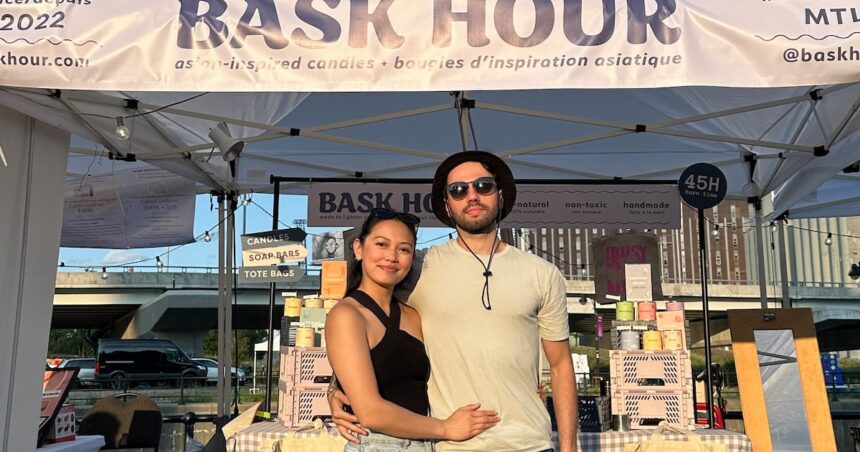As Montreal embraces Asian Heritage Month this May, I’ve been exploring how local Asian-Canadian entrepreneurs are weaving their cultural identities into the fabric of our city’s business landscape. Walking through the Shaughnessy Village yesterday afternoon, the vibrant energy was palpable – a beautiful testament to how cultural celebration extends far beyond traditional festivities.
The crisp spring air carried the scent of freshly steamed bao from Maison Bao, where owner Lin Wei greeted customers with the same warm smile I’ve come to appreciate during my weekly visits. “My grandmother’s recipes aren’t just food,” Wei told me while carefully pleating a dumpling. “They’re stories of resilience that traveled from Shanghai to Montreal. When customers taste our food, they’re experiencing my family’s journey.”
This sentiment echoes throughout Montreal’s Asian-Canadian business community. According to the Quebec Association of Asian Entrepreneurs, there’s been a 34% increase in Asian-owned businesses across the city over the past five years, with particularly strong growth in the food, technology, and design sectors.
For Joyce Kim, founder of Rue Saint-Denis boutique Hanbok Modern, Asian Heritage Month offers an opportunity to showcase how traditional Korean aesthetics can be reimagined for contemporary Montreal life. “I’m not just selling clothes,” Kim explained as she adjusted a display featuring modern interpretations of traditional Korean garments. “I’m creating a bridge between cultural worlds.”
Kim’s boutique represents a growing trend among Asian-Canadian entrepreneurs who are finding innovative ways to honor their heritage while creating distinctly Montreal experiences. Her spring collection incorporates materials from local Quebec textile manufacturers, creating pieces that truly represent cultural fusion.
The significance of these businesses extends beyond economic contribution. Dr. Victoria Ng from Concordia University’s Department of Sociology and Anthropology points to their cultural importance. “These spaces serve as informal cultural ambassadors,” she explained during our conversation at her office overlooking the downtown skyline. “They create accessible entry points for Montrealers to engage with Asian cultures beyond superficial tourism.”
This cultural exchange feels increasingly vital in our current climate. The Centre for Research-Action on Race Relations reports that anti-Asian incidents in Montreal increased by 300% during the pandemic, making visibility and community-building through entrepreneurship particularly meaningful.
Restaurant owner James Chang of Golden Rice Bowl on Boulevard Saint-Laurent has witnessed this firsthand. “During the pandemic, some regular customers started coming twice a week instead of once,” he shared as we sat at his favorite corner table. “They told me they wanted to show support. Food became a way of saying ‘we stand together.'”
The Montreal Asian Heritage Festival, running throughout May, highlights these businesses through food tours, pop-up markets, and business networking events. Festival director Mei Lin expects over 15,000 attendees this year, a significant increase from previous celebrations.
“We’re seeing more non-Asian Montrealers participating than ever before,” Lin noted during the festival’s opening ceremony at Place des Arts last weekend. “There’s a genuine curiosity and appreciation that goes beyond exoticism. People want authentic connection.”
This authentic connection is precisely what Anh Nguyen cultivates at Café Saigon Memories in Côte-des-Neiges. The tiny café doesn’t just serve Vietnamese coffee – it serves memory. Photographs of 1970s Saigon line the walls, and Nguyen often shares stories of his family’s arrival in Montreal in 1979 with interested customers.
“When I opened this café ten years ago, I worried Montrealers might not appreciate the bitter strength of properly prepared Vietnamese coffee,” Nguyen laughed as he demonstrated the traditional phin filter brewing method. “Now I have Quebec-born customers teaching newcomers how to drink it properly!”
Financial institutions have taken notice of this business sector’s growth. The Canadian Imperial Bank of Commerce recently launched a special initiative providing mentorship and financing options specifically for Asian-Canadian entrepreneurs in Quebec. According to their provincial director, applications from Montreal have increased by 27% in the past year alone.
For young entrepreneurs like Sophie Wong, who recently opened digital marketing agency East-West Strategies in Mile End, these supports are crucial. “As a third-generation Chinese-Canadian, I navigate multiple identities daily,” Wong explained as we met at her minimalist office space. “My business approach blends Eastern relationship-building philosophy with Western marketing strategies. This duality is my competitive advantage.”
Wong’s agency specifically helps traditional businesses from Chinatown and Little Manila establish digital presences, creating a beautiful cycle of community support. Last month, her team helped the 47-year-old Pâtisserie Harmonie establish its first website and social media strategy, resulting in a 40% increase in younger customers.
As our city continues evolving into an increasingly diverse cultural mosaic, these businesses represent something profound about Montreal’s identity. They remind us that cultural celebration isn’t confined to designated months or festivals – it happens daily through countless meaningful exchanges over countertops, in fitting rooms, and across café tables.
I left my conversation with Joyce Kim yesterday carrying both a beautifully crafted scarf and her parting words: “In Montreal, we don’t just preserve culture like museum pieces. We live it, adapt it, and share it. That’s the real celebration.”







